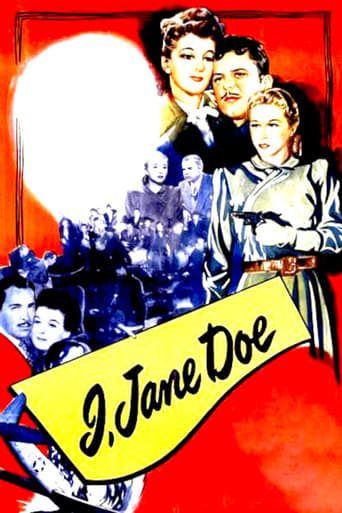mark.waltz
Critics had a blast in the 1940's and 50's blasting the films and acting of Vera Hruba Ralston, the Mary Pickford and Norma Shearer of Republic pictures, minus Oscar worthy material. She's the supposedly shady lady here, in trial for the murder of a man she key during the war, minus the truth of his marital status. By chance, she ends up being defended by his legal wife (Ruth Hussey) who learns surprising truths about the man she loved as the facts unfold. It's nasty, media obsessed trial is more scandalous than any case she's tried, and it's possible that the outcome may end up being heartbreaking for both ladies.Within the meat of the trial story cones the soap opera, exposing the late husband (John Carroll) for all sorts of unethical goings on. Hussey has her hands full, not only for the barrage of convoluted testimony she gets but the tough rebuttal by determined Gene Lockhart. Flashbacks to Hussey finding out how dishonorable her husband was before he left for France on active duty, how Carroll and Ralston met and became involved, how Carroll dumped Ralston to return to his wife, and the final curtain in Carroll's life leads to a convoluted melodrama that requires a map to route it all out.As an actress, Ms. Ralston follows directions very well, but is simply just bland and uncinematic. Compared to Hussey, she's a blank slate. What stands in the way of this being memorable for Hussey's performance is the unbelievably confusing script. As far as women's pictures go, this is weepy simply because you're fighting to restrain yourself from falling asleep and get more frustrated by the absurdity. Benay Venuta, Adele Mara, John Howard and especially Gene Lockhart deliver excellent performances that along with Hussey's barely escape Ralston's ineffectiveness and the shallowness of the script.
bmacv
Though its title contains a suggestion of film noir, I, Jane Doe is more of a post-war women's weeper hung along a suspense plot. That plot can be swiftly summarized: War bride kills American husband and is then defended by bigamous husband's widow. It's neither a terrible nor an incompetent movie, but it's rather a dull and improbable one, redeemed mainly by Ruth Hussey's fresh and unmannered portrayal of the two-timed defense attorney.She had it all, at one time: A thriving Manhattan law practice, a modern high-rise apartment boasting a fireplace as big as Charles Foster Kane's at Xanadu, and a husband whom one of the characters, obviously deranged by the wartime shortage of men, calls a `dreamboat' (John Carroll). When Carroll goes to France as a fighter pilot, a chain of circumstances heavy on stock footage lead him to wed a French war widow (Vera Ralston). When she doesn't hear from him after his return Stateside, she sells her country farmhouse and pursues him to New York, using a forged passport. Carroll's so glad to see her he turns her in to the immigration authorities. Bad move, for hell hath no fury....The bulk of the story is told in a courtroom during Ralston's second murder trial (following the first, when she was sentenced to death, she was found to be pregnant). Frequent glissandos on the harp accompany `washes' forward and backward that come with the monotony of pounding surf. (They're the only things approximating `style' in the movie.) But Gene Lockhart as the prosecuting attorney and Benay Venuta as Hussey's assistant liven matters up tolerably, lending able support to Hussey's strong central performance.


